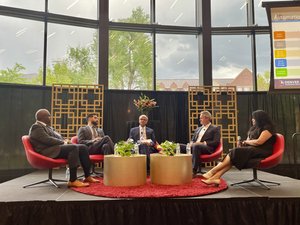
When he enters a meeting with potential investors, Shaka Bahadu runs through an internal checklist.
How does he look? Is he standing tall and keeping his chin up? Is he presenting confidence, while not seeming overly aggressive?
He may not appear to be weighing these questions, but his mind is racing as a Black founder preparing to present to interested investors.
And when Bahadu enters the room, another emotion washes over him -- the need to prove himself to the mostly white audience that holds his financial future.
“To level the playing field, I talk about my experience first, in hopes of combatting any potential prejudice,” he said. “I shouldn’t have to do that, the fact that I’m in the room should be enough.”

And Bahadu has much to talk about. Prior to co-founding Denver’s Cipher Skin, he graduated from Harvard University as an undergrad, got his MD from Cornell University and topped it off with an MBA from Stanford University. Following his schooling, Bahadu has held a variety of executive medical roles at Y Combinator startups.
And yet, he still feels the need to prove himself to investors. He understands that the startup lore surrounding college dropouts, like Steve Jobs, Bill Gates and Mark Zuckerberg, doesn’t apply to Black founders.
“It’s unfair,” he said. “We have to do and prove so much more when we get through the door.”
That experience is not unique to Bahadu, and is shared by founders of color across Colorado.
Lawrence Wagner, founder of Colorado Springs-based Spark Mindset, said that walking into a room full of white investors can be daunting.
“When you don’t see anybody that looks like you, it’s really intimidating,” he said. “I’d love to see people of color in the VC scene, because there is none.”
Wagner founded edtech startup Spark Mindset in late-2017 after serving in the military and transitioning to a career in IT. His goal was to break the cycle of poverty by helping people in low income communities prepare for careers in cybersecurity.
When Covid-19 hit, he was in the middle of fundraising and had to scrap those plans as investor interest dried up. Even before the pandemic, Wagner said he’s struggled garnering investor interest.
“Even in the accelerators or events dealing with investors, it’s hard to get them to talk to me,” he said. “I always feel like I’m in a crowd and I have to find some way to stand out.
Colorado’s current tech and startup diversity
While he’s split time between California and Denver in the last year, Bahadu thinks Colorado’s startup scene has a ways to go in terms of diversity and inclusion.
“I’ve found the community somewhat engaging, but certainly there has not been any demonstrable talk about diversity and inclusion in Denver,” he said. “I see little pockets of proactive change making happening, but in terms of diversity of race, there is a dearth of [action].”
Makisha Boothe, founder of Denver’s Sistahbiz, said that Colorado has organizations to support Black entrepreneurs, but they’re fragmented.
She pointed to the state’s geography and lack of a distinct urban center as a reason Black entrepreneurs feel distant.
“It’s really hard for us to find each other to create community,” she said. “That’s probably the biggest challenge on where Colorado stands for Black entrepreneurs -- to find a movement.”
Sistahbiz is a business accelerator providing affordable options for coaching, training and services to help Black women. The organization is now approaching its third year and has more than 2,000 women as part of its community.
David Potter, founder of Denver-based Curu, agreed that the community needs a central organization to amplify the voices of founders of color.
“If there was a flagship program or initiative that would send a signal and be very meaningful, that would help,” he told Colorado Inno. “I don’t know what the Black tech community can plug into.”
Throughout its growth, Curu called numerous cities home before it settled in Denver. After going through Techstars Western Union Accelerator in 2019, the personalized credit approval solution startup said it felt at home in the city.

With a diverse founding team, Potter said Curu has found an accepting place to put down roots in Denver.
“It’s still far from the perfect community, but I think it’s off to an amazing start and more than anywhere else I’ve been. It feels the most like home,” he said.
In Colorado Springs, Wagner said more work is to be done, but the community there and in Denver has begun to realize the importance of diversity.
“I think both populations are beginning to realize the value of having a diverse startup ecosystem and how important Black founders are to this conversation,” he said.
How Colorado’s startup scene can be more inclusive
All the people we interviewed for this story agreed that words are nice, but actions will define Colorado’s effort to be more inclusive.
Success locally comes down to two metrics that have become synonymous with this movement: wire and hire.
"I see all of these people posting things, and that’s nice, but we want to see action."
The founders agreed that for this movement to have real impact, venture firms must fund Black-led startups and companies must hire a diverse set of employees.
“We exist, we are highly educated and we work very, very hard, just like everyone else,” Bahadu said.
He added that companies need to stop positioning Black hires as diversity hires; showing instead that this person is qualified and belongs on the team. And for funding, he’s hopeful investors will take risks on Black entrepreneurs with big ideas.
“If investors are willing to take the risks in early stage-startups and companies, then take the risk broadly,” he said.
Boothe said organizations need to keep Black entrepreneurs in mind at the highest levels of decision-making.
“We need to start questioning the decisions that are made in boardrooms when Black women are not at the table,” she said. “Who’s advocating for Black women entrepreneurs at the table?”
Boothe added that organizations need to do more to encourage access for Black entrepreneurs.
“Organizations that aren’t doing well have a 'build it and they’ll come' mentality. That’s not what you want to do when you invite an underserved, historically oppressed population,” she said. “People need to redefine access so that its way more than 'the doors are open at 8 and anyone can come.'”
In order for this movement to succeed, Wagner said the Black startup community needs to see results, rather than social media buzz.
“I see all of these people posting things, and that’s nice, but we want to see action. Invest in us, buy our products, introduce us to other people,” he said. “When I start seeing that, that’s when I’ll believe people are serious about this.”









